Poker - How To Play ?
How to Play Poker?
Get to know the basic hand rankings and rules that govern Texas Hold’em. Here are the 10 hands to know before joining the action.
Royal Flush
The ace, king, queen, jack and ten of a single suit. Get to know Poker’s most famous hand, a royal flush, almost impossible to be beaten
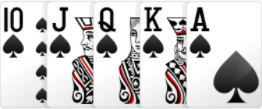
Straight Flush
Five cards of the same suit in sequence. In the event of a tie, the highest rank at the top of the sequence wins.
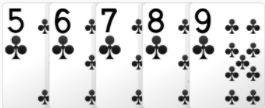
Four of a Kind
Four same-rank cards, and one side card or ‘kicker’. In the event of a tie, the player with the highest side card (‘kicker’) wins.
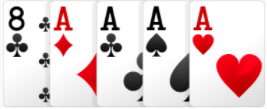
Full House
Three same-rank cards, and two cards of a different, matching rank. In the event of a tie, the highest three matching cards wins.
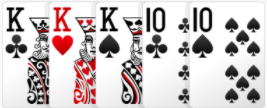
Flush
Five same-suit cards, not in sequence. In the event of a tie, the player holding the highest ranked card wins.
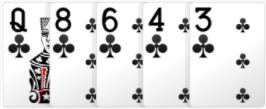
Straight
Five non-suited cards in sequence. In case of tie, the highest-ranking card at the top of the sequence wins.
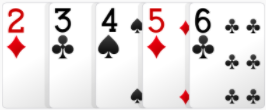
Three of a Kind
Three same-rank cards, and two unrelated side cards. In case of a tie, the player wins with the highest, and if necessary, second-highest side card (‘kicker’)
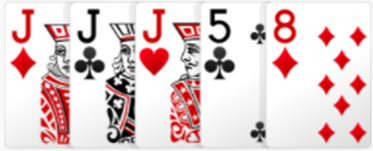
Two Pair
Two matching-rank cards; two cards of different matching rank, and one kicker. The highest kicker wins in case both players have an identical Two Pair.
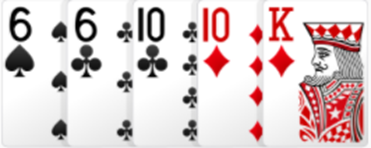
Pair
Two cards of matching rank, and three unrelated side cards. In the event of a tie, the player with the highest, and if necessary, second or third-highest side card wins.
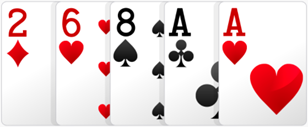
High Card
Any hand not qualifying under the categories listed. In the event of a tie, the highest card wins, such as ‘ace-high’.
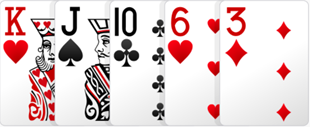
Try Different Games
Are you very confident while talking about No-Limit Hold’em? Great! Here are more game variations and tournaments than any other site can offer. Dive into the new game collection and become the ultimate poker player.
Getting Started
Dealing Cards and Betting Rounds
After dealing the initial cards, players are usually called upon to act in turn, moving clockwise around the table.
There are several possibilities, each player can take when it is their turn to act:
- Check – declining the opportunity to open the betting. Players can only check when there is no bet during the current round. The checking act passes the action clockwise to the next person. If all active players check, those players remain in the hand and the round completes.
- Bet – Players may bet if no other players have bet during the current round. Once a bet is made, other players must ‘call’ by matching the amount bet, in order to remain in the hand.
- Fold – Players who fold forfeit their cards, they cannot win or act again during the current hand.
- Call – Players can call if other players have bet during the current round; this requires the calling player to match the highest bet made.
- Raise – Players may raise if other players have bet during the current round; this requires the raising player to match the highest bet made, and then make a greater one. All subsequent players are required to call the raise or raise again (‘re-raise’) to stay in the hand.
Betting rounds for different kinds of poker are different. Two most popular poker games - Texas Hold’em and Omaha have identical betting structures, with four rounds of betting known as pre-flop, the flop, the turn and the river.
As all the players have received their hole cards, the pre-flop betting round begins. Betting on the flop occurs after dealing the first three community card; on the turn after the fourth community card; and on the river after the fifth and final community card.
Betting continues until every player has either matched the bets made or folded (if bets are not made, the round is complete when every player has checked). When the betting round is completed, the next dealing/betting round begins, or the hand is complete.
Let’s discuss the example of a Texas Hold’em hand after all the cards have been dealt. In the picture you see that players may use any of their two hole cards with any of the five community cards to make the best five-card hand they can make - here you can use both your hole cards and three of the shared community cards to make a straight.
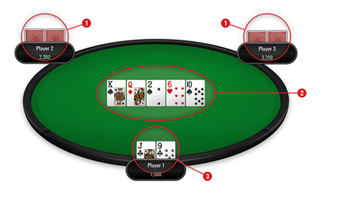
- Your opponents’ hole cards
- Community Cards
- Your hole cards
Showdown
A showdown occurs when the last bet or raise has been called during the final round of betting. The remaining active players must show their hands, and the player(s) with the best ranking hand(s) win the pot.
Multiple players can share a single pot, with the pot divided in different ways that depends on the game rules and how each player’s hand ranks against their opponents.
Betting Limits
The amount players may open and raise are called Betting limits. Typically, poker gamesare of the following types; no limit, pot limit or fixed limit.
- No Limit – each player can bet or raise by any amount, including their full stack in any betting round.
- Pot Limit – each player can bet or raise by any amount, including the size of the total pot at that time.
- Fixed Limit – each player can choose to call, bet or raise only by a fixed amount. The fixed amount is set in advance.
For No Limit and Pot Limit games, the ‘Stakes’ column in the PokerStars lobby indicates the Small Blind and Big Blind in that game. As for the Mixed Games, the Stakes listed in the lobby are the betting amounts for Limit games; in Pot Limit and No Limit rounds, the blinds are usually half of the blinds in limit games.
Table Stakes and All-in
Only the chips in play at the beginning of each hand can be used during the hand. According to the table stakes rule application -All-In, a player cannot be forced to forfeit a poker hand because of not having enough chips to call a bet.
A player not having enough chips to call a bet is declared All-In. The player is eligible for the portion of the pot up to the point of his final wager. All further action involving other players takes place in a ‘side pot’, which the All-In player is not eligible to win. There can be more than one side pot, in case more than one player goes All-In.
As far as you already know the rules, it’s time to play!
In case any questions, our super-friendly support is here to help!

